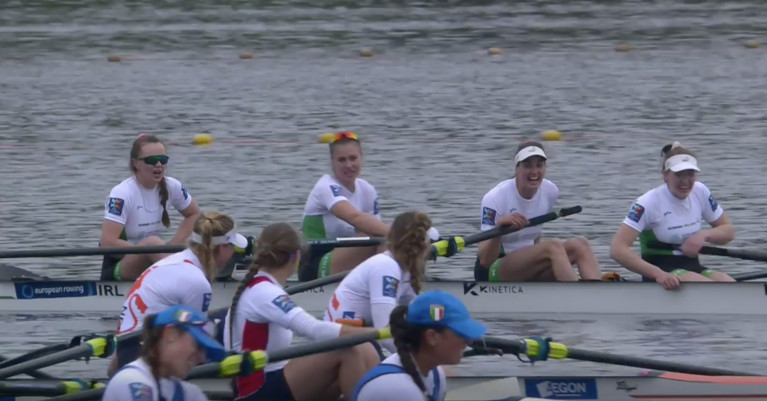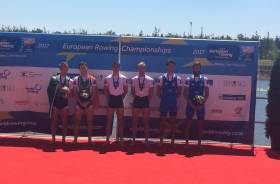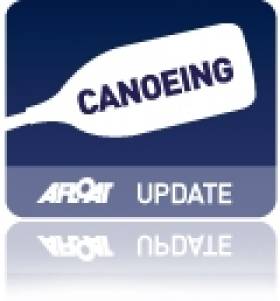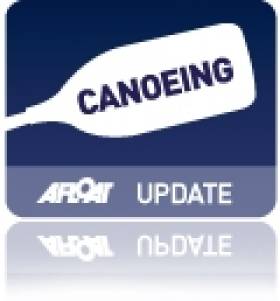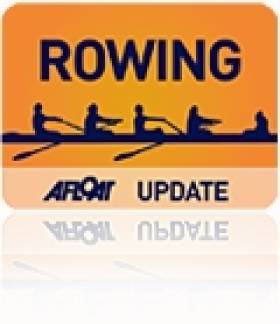Displaying items by tag: Silver Medal
Ireland Women's Four Take European Silver
The Ireland women’s four took a wonderful silver medal at the European Rowing Championships in Varese, Italy, today.
The crew of Aifric Keogh, Eimear Lambe, Fiona Murtagh and Emily Hegarty raced so well that they pushed up very close to the Netherlands in a push for gold.
The new Irish combination started slowly, but slotted into the leading trio of the Dutch, British and Irish. In the third quarter the Ireland four pushed through Britain and then tested the Dutch coming to the line.
Britain, with Rebecca Shorten of Northern Ireland in the stroke seat, took bronze.
Earlier, the women’s pair of Aileen Crowley and Monika Dukarska showed well in the early stages of their A Final, but in a hot race they were pushed back to sixth at the finish. Britain’s Helen Glover and Polly Swann justified their favouritism to race to gold – but they were given a battle by Romania, while Spain took the bronze.
Gary O’Donovan had to settle for fourth in his A Final of the lightweight single sculls. The race belonged to Peter Galambos of Hungary: he led through all four quarters. O’Donovan made ground in the closing stages, but was 4.3 seconds off Galambos at the finish.
Lydia Heaphy got off to a great start in the lightweight women’s single and led early on. However, Alena Furman of Belarus moved swiftly into the lead and stretched it down much of the course to win gold. Heaphy finished sixth.
Enniskillen woman Holly Nixon teamed up in the Britain double with Saskia Budgett to take a bronze medal in a race won by Romania.
European Rowing Championships, Varese, Italy, Day Three (Irish interest)
Men
Double Sculls – B Final (Places 7 to 12): 1 Ireland (R Byrne, P Doyle) 6:21.47, 2 Italy 6:22.52, 3 Germany 6:23.29.
Single Sculls – C Final (Places 13 to 18): 1 Russia 7:08.08, 2 Ireland (D Lynch) 7:09.01.
Lightweight Single Sculls – A Final: 1 Hungary (P Galambos) 7:01.52; 4 Ireland (G O’Donovan) 7:05.82.
Women
Four – A Final: 1 Netherlands 6:27.51, 2 Ireland (A Keogh, E Lambe, F Murtagh, E Hegarty) 6:27.96, 3 Britain (4 R Shorten) 6:31.27.
Pair – A Final: 1 Britain 7:02.73; 6 Ireland (A Crowley, M Dukarska) 7:11.83.
Double Sculls – A Final: 3 Britain (1 H Nixon) 6:55.13.
Lightweight Single Sculls – A Final: 1 Belarus (A Furman) 7:41.81; 6 Ireland (L Heaphy) 7:58.70.
Puspure Takes Silver Medal at World Cup Rowing In Lucerne
#Rowing: Sanita Puspure took a silver medal for Ireland at the World Cup Regatta in Lucerne. The world champion, Jeannine Gmelin of Switzerland took gold, but only just, in a thrilling finish. Puspure was under pressure for second from Carling Zeeman of Canada, but the Ireland sculler has a great finish and pushed right up on Gmelin, finishing just .23 of a second behind her.
World Cup Regatta, Lucerne, Day Three (Selected Results; Irish interest)
Men
Pair – B Final (Places 7 to 12): 1 Spain Two 6:40.42; 3 Ireland (M O’Donovan, S O’Driscoll) 6:43.27.
Lightweight Double Sculls – A Final: 1 Ireland (G O’Donovan, P O’Donovan) 6:28.50, 2 Belgium 6:29.30, 3 Denmark 6:32.39.
Women
Pair – B Final: 1 Spain 7:25.23; 4 Ireland (A Keogh, T Hanlon) 7:32.46.
Double – B Final: 1 Czech Republic 7:05.30; 3 Ireland (M Dukarska, A Crowley) 7:06.92.
Single – A Final: 1 Switzerland (J Gmelin) 7:35.94, Ireland (S Puspure) 7:36.17, 3 Canada (C Zeeman) 7:37.03
European Silver for Ireland's O'Donovan Brothers
#Rowing: On a wonderful day for Irish rowing, Paul and Gary O’Donovan produced a trademark burning finish to take Ireland’s third medal – silver – at the European Championships in Racice in the Czech Republic.
France showed their familiar control to take gold, while the O’Donovans moved through the field to take out Britain, Poland and then win a sprint with Italy for silver.
The day had started with a gold medal for Mark O'Donovan and Shane O'Driscoll in the lightweight pair and a silve for Denise Walsh in the women's lightweight single.
European Rowing Championships, Day Three (Selected Results; Irish interest)
Men
Lightweight Pair – A Final: 1 Ireland (M O’Donovan, S O’Driscoll) 6:32.34, 2 Russia 6:34.74, 3 Italy 6:34.89; 4 Britain (J Cassells, S Scrimgeour) 6:39.75.
Lightweight Double Sculls – A Final: 1 France 6:17.67, 2 Ireland (G O’Donovan, P O’Donovan) 6:20.06, 3 Italy 6:20.36.
Women
Lightweight Single Sculls – A Final: 1 Sweden (E Fredh) 7:36.24, 2 Ireland (D Walsh) 7:38.00, 3 Switzerland (P Merz) 7:39.94.
Silver Dream For Ireland at World Junior Championships
#Rowing: Ireland’s Aoife Casey and Margaret Cremen took a silver medal at the European Junior Rowing Championships today in Germany. The Skibbereen/Lee crew took second behind dominant crew Germany, and ahead of Italy, who took bronze. In a strong field, Denmark, the Czech Repbublic and Britain took the next three places. Ireland had the best last 500 metres, pushing up on Germany, but Italy came strong at the end to give the girls in green a small scare.
Casey, a daughter of Ireland coach Dominic, represented Ireland as a junior at the World Championships last year, while Cremen took a bronze medal at the Coupe de la Jeunesse in 2016.
Ireland’s three other crews placed in the top 10 to make it a very satisfactory campaign in Krefeld.
European Junior Championships, Krefeld, Germany (Selected Results; Irish interest, Day Two)
Men
Pair – Semi-Final B: 6 Ireland (A Johnston, R Corrigan) 7:17.95. B Final: 4 Johnston, Corrigan 7:20.57.
Sculling, Quadruple – Semi-Final B: 5 Ireland (J Quinlan, J Keating, M Dundon, B O’Flynn) 6:20.31. B Final: 4 Ireland 6:24.6
Women
Pair – Semi-Final A: 4 Ireland (G McGill, E O’Reilly) 7:51.31. B Final: 3 Ireland.
Sculling, Double – Semi-Final B: 2 Ireland (A Casey, M Cremen) 7:26.83. A Final: 1 Germany 7:21.64, 2 Ireland 7:25.84, 3 Italy 7:28.32; 4 Denmark 7:31.32, 5 Czech Republic 7:40.58, 6 Britain 7:44.31.
Canoeist Hendrick Takes Silver for Ireland at Youth Olympic Games
#CANOEING: Ireland’s Robert Hendrick took a silver medal in the C1 Obstacle Slalom at the Youth Olympic Games in Nanjing in China. The event is run on a head-to-head format and the 16-year-old took on and beat Leon Breznik of Slovenia in the semi-finals. In the final, Hendrick lost out to France’s Lucas Roisin, who won gold. Hendrick is coached by three-time Ireland Olympian canoeist Eoin Rheinisch.
Youth Olympic Games, Nanjing, China (Irish interest)
Canoeing: C1 Obstacle Slalom – Semi-Final: 1 Ireland (R Hendrick) 1:18.752, 2 Slovenia (L Briznik) 1:25.750.
Final: 1 France (L Roisin) 1:18.179, 2 Ireland (R Hendrick) 1:19.047.
Canoeist Liam Jegou Takes World Championship Silver
#CANOEING: Ireland junior canoeist Liam Jegou took a silver medal today at the Canoe Slalom Under-23 and Junior World Championships in Sydney, Australia. On a difficult course in Penrith, only Florian Breuer of Germany was faster in the C1 (canoe single) than the Irishman. Both men took one touch, Jegou’s on the fourth gate. Roman Malyshev of Russia was third and Britain’s Samuel Ibbotson fourth.
“It’s great, I am really happy,” Jegou said. He had come close to a podium finish in the last two years, finishing sixth last year and fourth in 2012.
Canoe Slalom World Under-23 and Junior Championships, Penrith, Sydney (Irish interest):
C1 Men – Semi-Final (10 qualify): 1 Britain (S Ibbotson) 109.47; 6 Ireland (L Jegou) 112.11 (2.64 behind). Final: 1 Germany (F Breuer) 104.31, 2 Ireland (L Jegou) 107.61, 3 Russia (R Malyshev) 108.54.
Coakley Takes Silver Medal at World Cup in Sydney
#ROWING: Skibbereen man Richard Coakley took a silver medal at the World Cup Regatta in Sydney Australia. The 30-year-old, competing for the first time in a regatta for Australia, had to give way to the faster Wang Tiexin of China in the A Final of the lightweight single sculls. The two fought it out at the head of the race, but Wang had too much for Coakley and moved clear in the final 500 metres.
Coakley won a World Cup medal for Ireland in the lightweight eight in 2005. He rowed for Ireland at the Olympic Games in 2008, coming in as a reserve for Gearóid Towey in the lightweight four in the B Final in Beijing. He moved to Australia in 2010.
World Cup Regatta, Sydney, Australia (Irish interest)
Men
Lightweight Single Scull – A Final: 1 China (Tiexin Wang) 7:05.54, 2 Australia One (R Coakley) 7:13.54, 3 Australia Two (J Harrison) 7:20.87; 4 Vietnam 7:22.75, 5 Hong Kong Two 7:33.45, 6 Vanuatu 7:54.72.


























